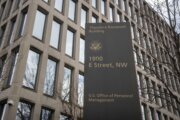Metro spent more than $125,000 on last year’s white nationalist rally, including an essentially private railcar for the tiny group of marchers, according to Metro data obtained by WTOP through a public records request.
The rally on Aug. 12, 2018, marked the anniversary of a deadly car attack in Charlottesville, Virginia, by a white nationalist, so the Metro Transit Police made plans to keep the group separate from any other riders in an attempt to avoid any incidents of violence.
The handful of attendees, some wearing conspiracy theory logos and others in “Make America Great Again” hats, were escorted into the Vienna Metro station as police closed off entrances. The group was then put on an essentially private car with armed guards for a ride to Foggy Bottom.
Kessler group being escorted to apparently private cars. They’re now figuring out if their poles they have flags on are allowed downtown pic.twitter.com/Bq8tWAz0Cz
— Max Smith (@amaxsmith) August 12, 2018
The doors did open at Dunn Loring, but police informed people on platform who was on car and several people went to next one down pic.twitter.com/uzyxueQKij
— Max Smith (@amaxsmith) August 12, 2018
Someone trying to get in was told to go to next car down pic.twitter.com/sQ8dXIBi1o
— Max Smith (@amaxsmith) August 12, 2018
The train ended at Foggy Bottom due to a 24/7 track work zone, and the group was met by large numbers of counter protesters as they walked several blocks under D.C. police protection to Lafayette Square, across from the White House.
Warning/profanity – Kessler group greeted at Foggy Bottom pic.twitter.com/09fjFj9iuI
— Max Smith (@amaxsmith) August 12, 2018
The group was eventually spirited out of the area to the Rosslyn Metro station for a trip back to Vienna after a much shorter event than they had planned.
According to the documents provided to WTOP, Metro attributed $115,275.34 in overtime and comp time to the event overall, more than 70 percent of which was for the Metro Transit Police.
The next largest amount of overtime or comp time was for rail services, followed by systems support and bus services.
Separate from the overtime attributed to the event, payroll data from Aug. 12, and a comparable Sunday a week later (when the same track work was underway), show Metro spent $128,662.74 more in gross employee pay on the day of the event.
Again, the largest single increase was for the Metro Transit police, with the next largest increases for the rail and bus services departments. Some hours were logged on each day in other departments without any direct pay being associated with the hours, indicating salaried workers are not necessarily factored into these spending calculations.
Since the totals for Aug. 12 and Aug, 19 pay include some non-overtime expenses, the total Metro spending related to the rally is likely somewhere between $125,000 and $240,000. The numbers provided do not include costs of any preparations before the event that did not include overtime or comp time.
The costs were covered through Metro’s regular budget, although General Manager Paul Wiedefeld expects to propose a contingency fund in the budget proposal he is releasing next month so that Metro has more of a buffer for unexpected large events in the future.
Metro’s costs surrounding the 2018 rally are in addition to the District government’s estimated security costs of about $2.6 million.
Virginia law enforcement agencies were also involved in responding to an preparing for the event, which came a day after peaceful rallies in Charlottesville marked a year since the car attack that killed Heather Heyer.
Virginia State police spent about $3.1 million on the anniversary response, mainly in Charlottesville, including not just salaries and overtime but also related deployment costs.
Rallies against racism this year in Charlottesville, on the second anniversary of the attack, were less contentious after more planning for a less heavy-handed police response.






